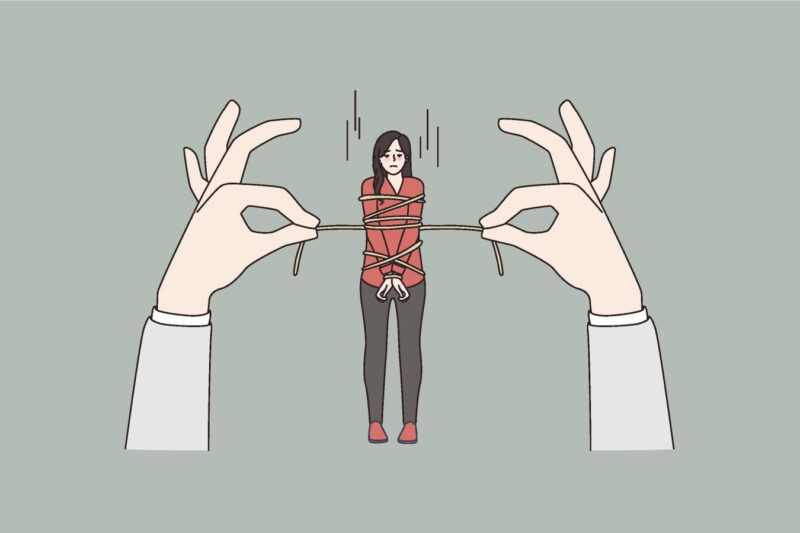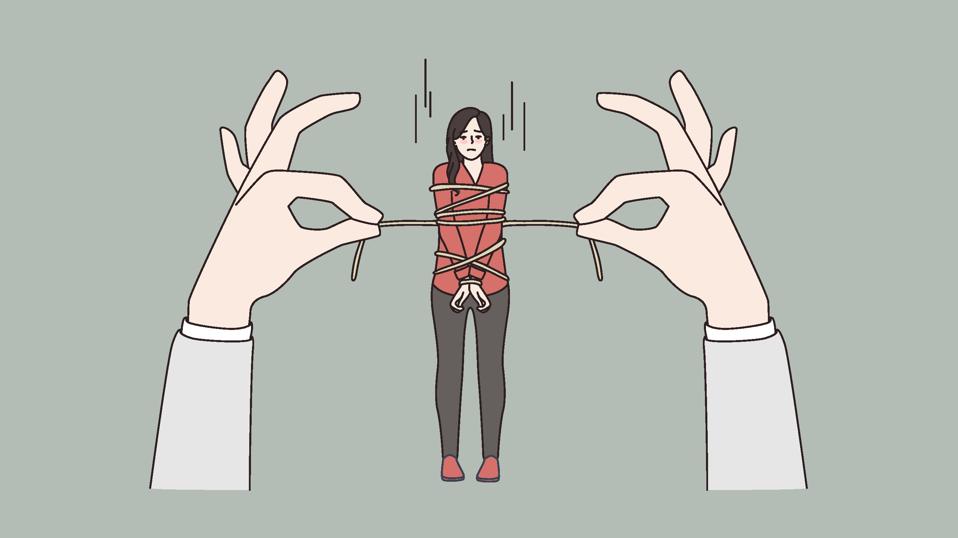To a narcissist, being in control is paramount. This is how to recognize their subtle tricks and defend against them.
getty
A narcissist won’t ever confess to being a narcissist, nor to having any undesirable traits. Their self-image is everything, and they will do just about anything to protect it — except admit when they’re wrong. They inhabit a very carefully curated world, in which everything is about them. Threatening that world is equivalent to threatening everything they believe in and stand for. This is why you will not get anywhere when you argue with a narcissist, or, at least, not immediately.
Here are three signs to watch out for when a narcissist is trying to assert their control over you.
1. They Use Their Silence As A Weapon
To keep you under their control, narcissists prefer to use silence as a tool, meaning that they won’t call, reach out or start the conversation first. When they’re bothered by something, they withdraw completely from your life, giving you the false impression that you’re more in need of them than they are of you. This distance puts you in an emotionally chaotic zone where you feel uneasy, prompting you to pursue them.
Their constant silence can throw their victims into a state of confusion, as they question whether something is wrong, or whether they’re just busy. People with an anxious attachment style are especially vulnerable to this tactic.
Not hearing from the narcissist drives them to send long messages — asking, pleading, trying to make up for imagined wrongs. When the narcissist finally decides to reappear, it’s usually when you’re at your most desperate and disoriented. You feel guilty and apologize, even though you’ve done nothing wrong and the blame was never yours to start with. In that state of confusion and relief, you settle for whatever excuse or explanation they give, just because you’re happy to have them back.
Narcissists’ partners typically end up suffering from symptoms of PTSD. A 2023 study published in the Journal of Personality and Individual Differences reported that one partner’s grandiose or vulnerable narcissism predicted PTSD symptoms for ex-partners, who had left the relationship for prior abuse and manipulation.
This research uniquely shows that narcissistic traits, especially grandiose narcissism, can directly and significantly impact on the mental health of survivors. This is especially true in terms of trauma responses.
If a narcissist uses silence as a weapon against you, don’t attempt to solve it. Don’t reach out to them for comfort, as this immediately gives them power over you. When you don’t behave in ways that are expected — that is, ignoring them — it will unsettle the narcissist. Avoid the compulsion to chase or overexplain; their silence is manipulation, not an indicator of your value.
2. They Place The Blame On You
Narcissists maintain control by blaming their victims for everything that goes wrong in their relationship, or even within their own life. In their eyes, both their actions and the way that they treat you are your fault. In turn, they take zero accountability or responsibility for their actions, mistakes and wrongdoings.
However, they won’t criticize your actions or behaviors; they will attack your character as a whole instead. This is in the hopes that you feel guilty and end up changing whatever the narcissist finds inconvenient. In turn, they can place themselves on a higher moral ground and maintain their control over you.
This is often due to the fact that narcissists cannot stand feeling ashamed, as their egos are already fragile. As a result, they tend to deflect their weaknesses and undesirable behaviors onto others, instead of accepting them. They cannot accept being anything but perfect, so they blame others for their own bad behavior or abuse.
For instance, instead of taking blame, a narcissist might respond with, “It’s your fault I’m angry, it’s because you are this way.” In turn, they maintain their superior image. The cycle ensures the narcissist’s dominance and power in the relationship because the victim is convinced that they’re responsible. In turn, the victim is the one that changes for the convenience of the narcissist.
A 2020 study published in the Journal of Aggression, Maltreatment & Trauma, explored how the DARVO strategy (Deny, Attack and Reverse Victim and Offender) influences people’s perceptions of abuse situations. It’s a strategy that allows abusers to protect their ego and preserve control by denying their wrongdoing, attacking their accuser’s credibility and reversing the roles of victim and offender.
Across two experiments involving over 600 university students, the researchers found that when perpetrators used DARVO, observers viewed victims as less believable and more to blame, while seeing perpetrators as less abusive. However, when participants were educated about DARVO beforehand, these manipulative effects weakened, showing that awareness can significantly reduce its power.
If a narcissist tries to use DARVO against you, do your best to wait before responding or defending. State facts objectively, and don’t internalize their accusations. Keep in mind that their compulsion to place faults on you instead of sharing responsibility speaks volumes about their own insecurities, rather than your own behavior.
3. They Gaslight You To Reframe The Narrative In Their Favor
Narcissists view things entirely through their own lens. How wronged they feel and how justified their reactions are will typically revolve around their own emotional experience; they cannot see situations from anyone’s perspective but their own. The way events unfolded, as a result, is always about how they were hurt first.
This is what makes defending yourself against a narcissist particularly tricky. When you try to explain your behavior, or offer context for what you think or feel, they might say you’re “making excuses.” They accuse you of changing the narrative to suit yourself — a classic projection tactic — even if multiple factors led to a single event.
They can’t accept another perspective because they need to be right. What they think matters, how they feel matters, but they never grace you with the same courtesy.
A 2020 study published in Social Behavior and Personality: An International Journal explored how narcissism reduces perspective taking and how a strong need for control explains part of that effect.
The researchers wanted to understand why people high in narcissistic traits tend to struggle with empathy, especially with seeing things from another person’s perspective. They found that the need for control partially explained this relationship, even after accounting for self-esteem.
This makes it especially important to remember that, before you begin to believe a narcissist’s version of events, take a pause and check the facts. Instead of assuming blame and accepting their version of reality, recollect your own and include a third person’s perspective. Share your experiences with trusted friends or a therapist; don’t let them isolate you.
To someone with narcissistic tendencies, it’s often all about maintaining control. Being aware of these maneuvers and knowing how they work keeps you centered in your truth and out of their trap of manipulation.
Concerned that you might have narcissistic tendencies? Take this science-backed test to find out if it’s cause for concern: Narcissism Scale









